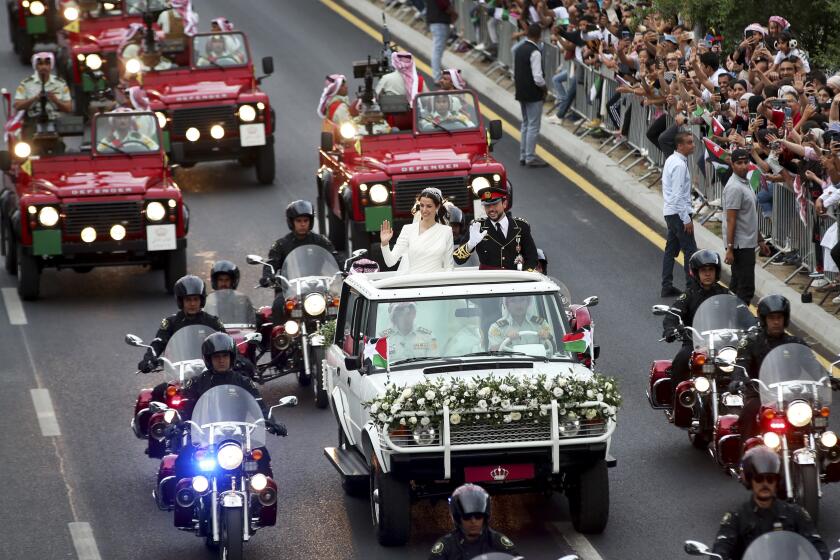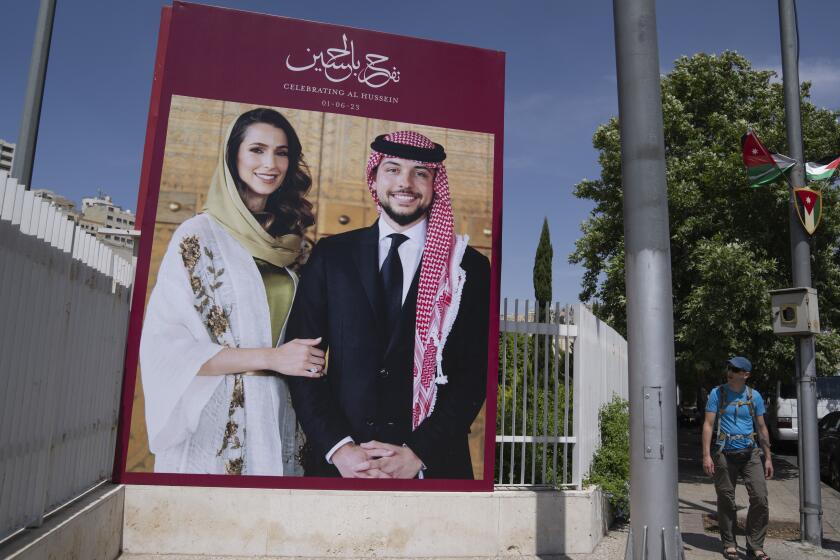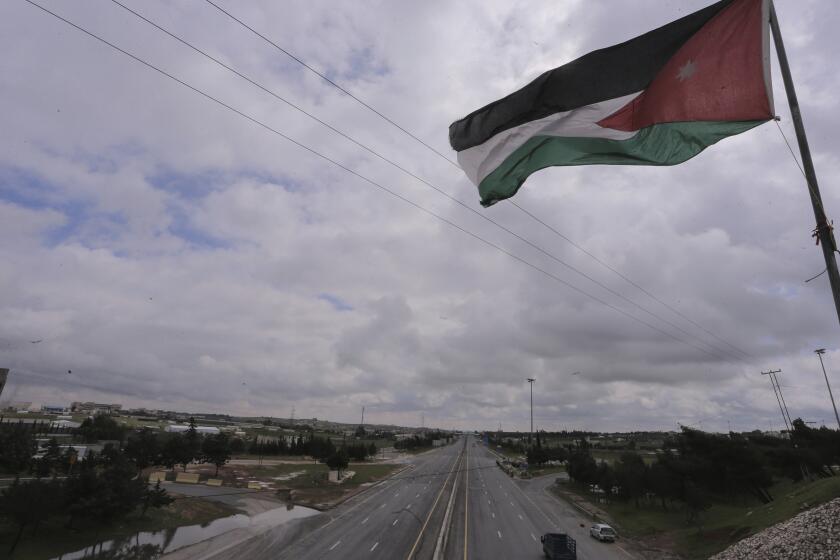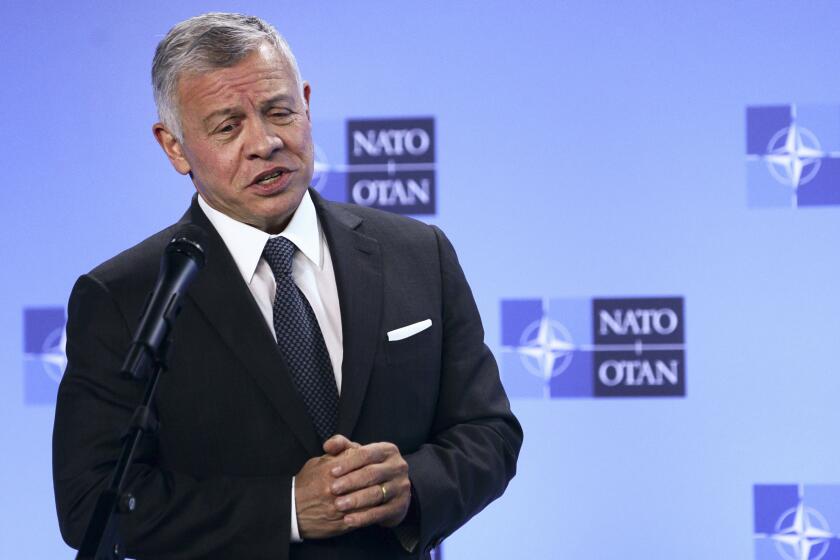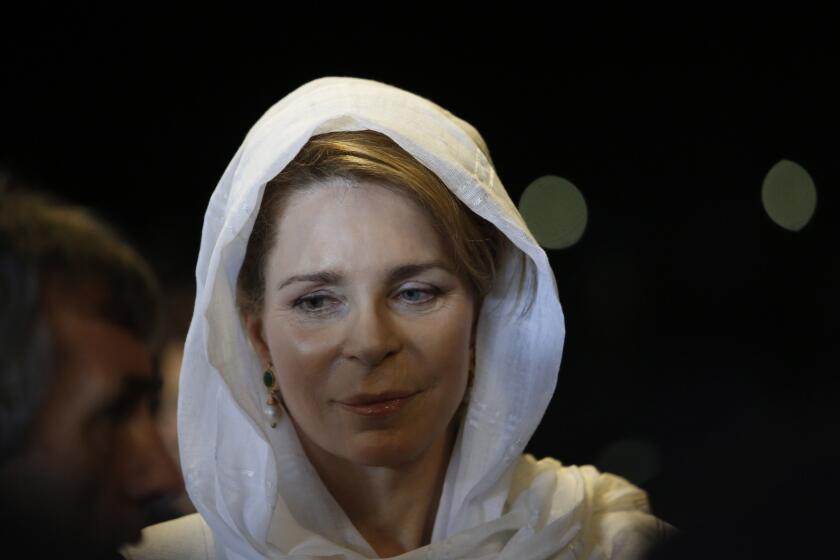Jokes about an Arab prince’s wedding got this satire site banned. Now there are 41 harsh new restrictions

AMMAN, Jordan — The satirists’ Instagram post showed Jordanian riot police arresting a man for throwing a party to honor his infant son. His crime? The fete was on the day of the crown prince’s wedding.
Another gag depicted an official campaign to ensure the Jordanian populace was expressing sufficient amounts of happiness for the royal family. If the kingdom’s subjects didn’t smile at an angle of at least 77 degrees, they would be fined.
Then there was the joke questioning where the prince got all the cash to cover the costs of his nuptials.
For AlHudood, the Middle East’s answer to the Onion, this was nothing new. The website, which has been committing what co-founder Isam Uraiqat calls “equal-opportunity satire” since 2013, regularly features headlines such as “Turkey and Syria agree to repatriate 50% of every refugee” and “Saudi government signs Hajj promotion deal with Cristiano Ronaldo.”
So of course a political satire website started in Jordan was going to poke fun at the kingdom’s celebrations for its crown prince’s wedding, an opulent affair that drew the famous and wealthy from all over the world. Besides, Uraiqat said, he and his team of writers had worked within the often-arbitrary confines of free speech in the region for a decade; they thought they knew how far they could go.
“We definitely didn’t think we were pushing any lines,” Uraiqat said of the Jordan wedding jokes. “We did this like any other story: We look at what’s relevant and worth talking about.”
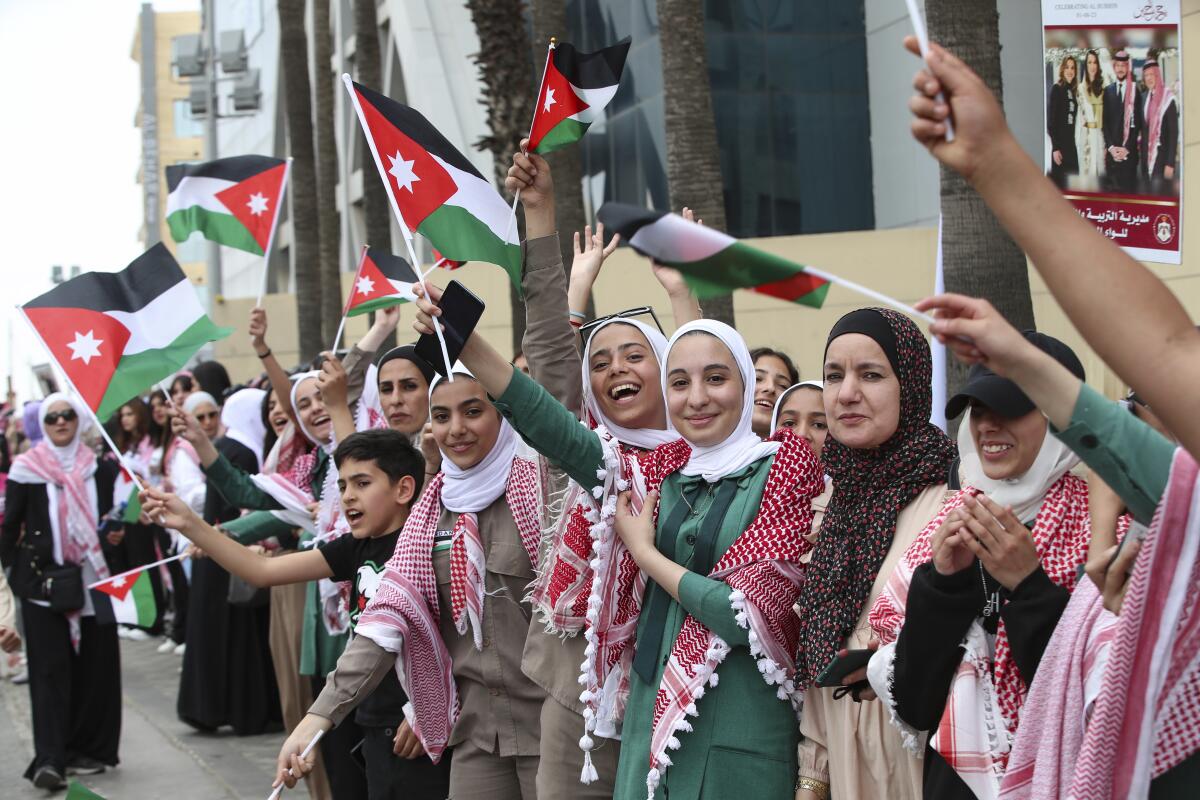
But a few weeks later, friends and colleagues were asking if the website was down. Readers in Jordan left comments saying they could no longer connect to the site.
The Jordanian government, with no statement and zero fuss, had blocked AlHudood, adding it to the list of dozens of outlawed sites.
“It wasn’t us who changed the line,” Uraiqat said.
Jordan is celebrating the wedding of Crown Prince Hussein to a Saudi architect with lavish events designed to showcase the heir to the throne.
The one-time screenwriter and activist had positioned the site as truth-telling court jester among the more dour forces controlling expression in the Arab world: government-sponsored news channels cheerleading state policy; sclerotic intelligence services and officials unable, or unwilling, to understand social media; and dictators projecting a tolerant image abroad yet quashing dissent at home
Jordan’s banning of AlHudood — its name in Arabic means “the limits” or “the borders” — signals a new trend in state censorship, both in Jordan and in the wider Arab world, one where satire, even frivolity in the face of authority, is deemed unacceptable, and officials just can’t take a joke.
A TikTok influencer was arrested in Dubai this month after releasing a video depicting a super-rich Emirati chucking stacks of bills to buy a fancy car. The Emirate of Dubai, part of the United Arab Emirates and marketing itself as an open-minded outlier in a conservative Persian Gulf, didn’t find it funny. (AlHudood is also banned in the UAE.)
Under the cover of “protecting morality,” the Iraqi government in February charged more than a dozen social media stars and activists with releasing what it judged to be “inappropriate content.” It even created a smartphone app so concerned citizens can report anything they find offensive.
Jordan is preparing for the wedding of its crown prince and a Saudi architect who studied at the Fashion Institute of Design and Merchandising in L.A.
Saudi Arabia, which a United Nations investigator found responsible for the “extrajudicial killing” in 2018 of a Washington Post journalist, has in recent years gone after social media posters. The kingdom has doled out fines and five-year prison terms since 2018 for people “producing and distributing content that ridicules, mocks, provokes and disrupts public order, religious values and public morals through social media,” according to the country’s public prosecutor.
Compared with the often dismal levels of free speech of its neighbors — in Syria, Iraq and Saudi Arabia — Jordan, a perennially impoverished desert kingdom of some 11 million people, has long enjoyed a reputation of relative openness.
Its 61-year-old monarch, King Abdullah II, is a staunch Washington ally who relies on the U.S. and other nations’ largesse to keep his country going. He often talks about democratic rights and fostering political parties.
Now Jordan’s government has enacted new — and critics say draconian — amendments to its already problematic cybercrime law. Many consider AlHudood a victim of the repressive media ecosystem the state tested out even before the law was sent to parliament.
Jordan’s king has addressed the public feud with half brother Prince Hamzah, calling it an attempted ‘sedition’ that caused him shock, anger and pain.
“It’s the same mentality that justifies blocking AlHudood,” said Raya Sharbain, who works as a security trainer in Jordan with the Tor project, which maintains software for the Tor anonymity network.
The 41 amendments, which the government fast-tracked to parliament this month and ratified with little modification in an extraordinary session Thursday, criminalize internet use for spreading false news, committing acts of defamation or causing damage to reputation or national unity.
Government officials argue the amendments will “protect society” and thwart what they say is an eight-fold rise in cybercrime cases between 2015 and 2022.
But critics and rights groups contend the language in the legislation is “rubbery,” that it grants the state legal authority to block entire social media, bans use of virtual private networks (VPNs) and surgically throttles websites.
It would also effectively outlaw criticism: A negative restaurant review on Google Maps, for example, could see its author charged with slander and forced to pay a fine exceeding $4,000.
Meanwhile, social media platforms like TikTok — already blocked in Jordan since December — would be required to open up a regional office before their sites could be used in the country.
“From the person streaming videos online to investigative journalists to lawyers — all will be affected. You might as well just switch off the internet already rather than have this law,” Sharbain said.
Jordan’s King Abdullah II denies impropriety in his purchases of luxury homes abroad, which were revealed in a massive leak of financial documents.
Others also speak of the chilling effect the new cybercrime law will have on any news outlet, with stiffened penalties including prison terms of one to three years for journalists and fines from roughly $28,000 to more than $70,000.
“The law says you’ll have to do prison time and pay money, leaving nothing to the judge’s discretion,” said Yahya Shuqair, an expert on Jordanian media legislation. “As an activist, even if I have facts as clear as the sun, I would be afraid to write them.” He added it was the latest in a years-long regression of press freedoms in the Arab world.
“There’s a difference between rule of law, and rule by law. And Arab nondemocratic governments use rule by law, whether it’s a satirical website or otherwise.”
The amendments provoked a rare rebuke of the government in the capital, Amman, from the U.S. State Department. The cybercrime law, said spokesman Vedant Patel, would inhibit future investment in the technology sector and further restrict the space for journalists, bloggers and civil society members to operate in Jordan.
“We reiterate that for countries to thrive there must be protections for freedom of expression, open debate, vibrant discourse, and information sharing, including online via press and social media platforms as well,” Patel said this week.
Uraiqat sees the law as a continuation of the region’s years-long rollback of press freedoms gained in the years following the Arab Spring; since then, he said, the space for media to operate has become even more restrictive than before the 2011 revolutions.
Reporters Without Borders, an international organization that tracks press freedoms, said Jordan’s ranking plummeted 26 places — from 120th to 146th — in the 2023 edition of its index, one of the region’s largest falls. (Norway ranks first, North Korea 180th, or last; the U.S. ranks 45th.)
“The things we could say seven years ago, now they put you in prison for them,” said Uraiqat, who co-founded AlHudood while he was still living in his home country of Jordan before moving to London with his partner in 2015.
“Authorities used to sometimes let things go, but now they don’t.“
Who is Queen Noor? Royal drama emerges, nearly 43 years after an American’s marriage to Jordan’s King Hussein.
The ramped-up crackdown comes at a sensitive time for King Abdullah II, whose British education and aloof, Western-inflected style have drawn criticism from some quarters that he’s out of touch with his people — a point that rankled two years ago when Prince Hamzeh, Abdullah’s half-brother and one-time crown prince, spoke out against Jordan’s leadership in what Abdullah insists was a coup attempt.
Even before that incident, the government restricted journalists’ work, issuing gag orders and forcing impossible-to-fulfill conditions on news sites. But afterward, Abdullah worked to future-proof his dynasty, changing the country’s laws to gain additional constitutional powers and displaying an ever-growing exasperation with criticism of his family and his policies.
He also raised the profile of his son and heir, Crown Prince Hussein, tasking him with managing relations with Jordan’s top international patrons and involving him in major decisions far beyond the ceremonial writ of the role.
Hussein’s wedding was of a piece with that promotional push: a days-long celebration that saw the entire nation festooned with pictures of the royal couple; a celebrity-heavy guest list numbering in the thousands and including British royals and First Lady Jill Biden.
Jordan enacted a public holiday so people could line the streets where the royal motorcade would pass. Days before the event, crews worked to beautify the route, freshening up paint on sidewalks and trimming hedges. (That too was grist for AlHudood’s mockery mill.)
With parliament passing the law, Uraiqat is expanding the site’s offerings, even though they won’t be seen in Jordan, or the UAE.
He has plans for a podcast and a television series and has started a fellowship program where aspiring John Oliver types can learn the intricacies of political satire in the AlHudood “newsroom.” He and his writers have also created a Razzies-like event, where AlHudood awards a prize to the most sycophantic news reports in Arab media.
“The problem isn’t just authoritarians, but in their tools to disseminate propaganda in the Arab world,” he said. He added that though the atmosphere in Jordan “is worrying in ways it has never been before,” the site won’t shy away from news — which it self-deprecatingly describes as “organized gossip” — about Jordan.
“The bigger authorities make an event out to be, the more it’s worth scrutiny,” Uraiqat said.
“They want to have one without the other, to go as big as they can without being checked or held accountable.”
More to Read
Sign up for Essential California
The most important California stories and recommendations in your inbox every morning.
You may occasionally receive promotional content from the Los Angeles Times.
